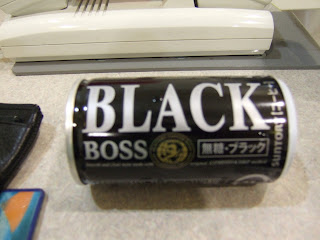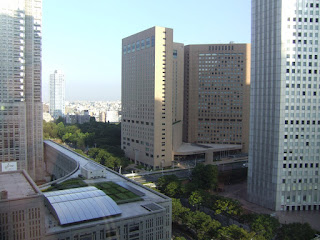







Hey everyone. Before I begin this post, I have a quick request. If you choose to leave a comment, which I highly encourage and appreciate, please leave your real name at the bottom if your username is somewhat nebulous. For example, jackmccoysr is not entirely obvious. Thanks. So there's some pictures. Take a look. Click. See better resolution. I plan to purchase a high-definition camcorder in the near future, so I may set up an auxiliary account on a site like Vimeo to upload such content. There, ideally, you can witness nature and people in stunning detail, along with clips of the critically acclaimed but not-yet-released-or-even-begun comedy show that Brian, my college friend, and I have conceived. So the last weekend was a fairly exciting one. One of the other JETs in the area, Pierre, was kind enough to allow to hop on the back of his motorcycle and go for a trip. Pierre is in his fifth and final year as a JET and exemplifies the Japanese "senpai" role. Typically, students or colleagues who are your senior (senpai) in Japan adopt a role of responsibility for the well-being and development of their juniors (kouhai). This system assumes that the junior will eventually grow older and carry out the same tasks. The responsibility bestowed on a senior usually involves some kind of mentoring, but it does extend into financial matters from time to time. Repayment and appreciation by juniors is, I believe, shown merely by later filling the senior role. Similar to the relationship between a child and his/er parents, the junior acquires a debt that can never be tangibly repaid. Pierre mentors me in various aspects of Japanese life, but neither of us is Japanese. So instead of carrying on in the traditional way, I think it's best that I buy him a nice meal every now and then. The weekend began by driving through a fairly vicious rainstorm and arriving at the home of Pierre's Japanese family; it's questionable whether I should place that in quotes. They are not related by blood, but the group is quite close and the parents used Pierre's name for their son's middle name. The family was very kind, and in retrospect, I should have gotten a picture with them. They all have varying degrees of English command, that is, various levels of superb English. I played with their son and daughter, spoke with the parents, slept over, and woke up for the next day's events. These were comprised of a trip to a local shrine, a short drive out into nature, and a visit with Pierre's nearby host parents from years ago. The shrine was home to a boar god, and in keeping with that, there are two boars kept there. Picture 4 is the elder boar and picture 8 is the infant; I believe they are not related. Boars, I should note, have cute, elongated, snuffly snouts. The rest of the pictures are of nature, some of locations that need to be captured by video. Picture 1 is a huge waterfall; see the people in the wooden structure at the top for scale. Picture 2 is a wide view from above the city we went to where the valley yawns before you, accompanied by a strange mountainous formation on the left. Picture 3 is a kind of secret waterfall, more narrow, more furious, and harder to locate than the first. Pictures 4 and 5 are from a high point on the shrine grounds. The valley below is home to a river and a small village, it seems. Just look; it's a nice view. Picture 7 is a horned grasshopper from the same area. Thanks, Pierre, for the weekend; it's great to get out and see nature, something I've failed to do on my own (partly due to not knowing where to go, partly due to distance, and partly due to using weekends to relax / be lazy). I will be doing this more on my own in the future, but being introduced to great people is truly appreciated. So enjoy the pictures, readers, and be sure to ask questions you may have about culture here. Everyday life does not grow mundane, but I grow accustomed to it. So things that seem normal here may surprise you a great deal. How about this example? I ordered something last week, and it came in the mail on Sunday, when I was not home. First, I didn't know they attempted delivery on Sunday. After the first attempt, they leave a note, and you use it to arrange via phone or internet another delivery. If you fail to respond, they usually try again every day for a week or so before, presumably, returning the item to its sender. It's nothing monumental, but it's slightly different than the way mail is handled at home. Or how about the school schedule? Students typically arrive at school at 7:30, I believe. I get here at 8:30, so I'm not 100% sure. But considering some travel as much as 40 minutes or more each way via bus or moped, both slow modes of transportation, they have to wake up pretty early. Why would they travel so far? High school is competitive in Japan. Depending on your strengths, you apply to high schools and either end up going to an academic school or one of a variety of vocational schools (agriculture, fishery, technical, etc.). Classes then end around 4:30, and many students go to their respective clubs, after school classes, or sports teams. It's not uncommon to see a number of students still around at 7, when they are asked to finally go home. So as far as the stereotype of Asian work ethic goes, yes, there's some truth to students over-working themselves, but keep in mind that plenty of students are lazy and there's a certain amount of forced over-work intrinsic to the system. Hey! That's all for now. Take care, everyone.
Chris














































